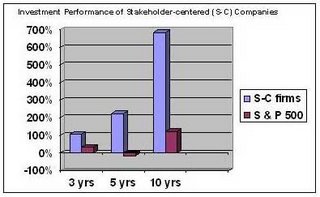
I read an excellent essay on
Conscious Capitalism by John Mackey- founder of Whole Foods. If you are interested in how the pursuit of profit and stewardship of people, money and the environment can co-exist, you will find the ideas that Mackey sets forth as worthy of consideration. The essay can be found here:
http://www.wholefoods.com/blogs/jmI will attempt to summarize some of Mackey's important points:
1. Profits are like happiness. They are best achieved when you don't focus on them. Mackey argues that profits will come when the stakeholders in the business- employees, management, vendors, customers and investors- are consistently satisfied.
There is a book coming out in February of 2007 called Firms of Endearment: the Pursuit of Purpose and Profit by David Wolfe, Rajendra Sisodia, and Jagdish Sheth. This book takes a look at the difference in performance between stakeholder centered companies- like Whole Foods- and traditional businesses that seek to maximize profits for shareholders (investors). The chart below compares the difference in stock performance between stakeholder companies (SC) and other companies in the S&P 500.
The stakeholder centered companies in the study include: Amazon, Best Buy, CarMax, Caterpillar, Commerce Bank, Costco, eBay, Google, Harley Davidson, Honda, JetBlue, Johnson & Johnson, Progressive Insurance, Southwest Airlines, Starbucks, Timberland, Toyota, UPS, and Whole Foods Market. 
This idea reminds me of John Templeton's philosophy. Templeton outperformed the market by an average of 3% annually per year after fees from 1954- 1992. He accomplished this in large part by buying shares of companies that perform a service beneficial to the world. He avoided buying shares in companies that prey on human weakness. One of Templeton's fund managers in the 1990s- Rusty Leonard- has incorporated this investment approach with a distinctly biblical worldview.
2. Executives should be compensated fairly but not outrageously. Whole Foods implements a policy that the highest paid executive makes only 19 times the average paid employee. The average for the S&P 500 was 411 times the average paid employee in 2005. As stewards of stakeholders' interest, executives should become wealthy as long-term stakeholder value is created.
Mackey contends that the best way to deal with envy is to become more transparent with compensation. Whole Foods shares the salaries of all employees. Mackey contends that by having this type of transparency people can see what types of skills are valued and rewarded in the organization and manage their career objectives accordingly.
Along those lines, Whole Foods distributes stock options so that employees can share in the creation of stock value over time. Only 7% of stock options go to the top 16 executives at Whole Foods. In comparison, 75% of stock options go to the top 5 executives at a typical S&P 500 firm.
3. Mackey believes that the stereotypes of good, altruistic non-profit organizations and greedy, selfish corporations are wrong. Mackey contends that the majority of non-profits are inefficient, wasteful and stagnant. He argues that both non-profits and businesses need to migrate towards a holistic model. Business and capitalism can be forces for enormous good in this world. The world has gone from nearly 95% poverty 200 years ago to 60% poverty currently. And with the emergence of China and India, the poverty rate is likely to be less than 25% by 2050. This reduction in poverty is attributed to increased profits, prosperity, technological innovation, etc... But the pursuit of profit at all costs is not a good thing for society and this is why Mackey urges businesses to adopt Conscious Capitalism.
I find Mackey's thoughts line up with my understanding of biblical stewardship even if Mackey doesn't share evangelical, biblical beliefs. A point that I have made in other blog entries is that God gave Adam a stewardship mandate in the Garden of Eden to grow, cultivate, take dominion over the resources that God provides- Genesis 1:28. Many environmentalists long for a return to the Garden like paradise. But God moves creation from a Garden- Genesis to a City- Revelation. Progress is a good thing if it is done according to God-honoring stewardship principles. We should not seek repristination. We should seek biblically progressive reformation. The good that was formed by God has been deformed by sin and needs to be reformed for the purposes of God.
For His Glory,
Ashley Hodge
 The Good Book tells us, "There is a season and a time for every matter under heaven"-Ecclesiastes 3:1.
The Good Book tells us, "There is a season and a time for every matter under heaven"-Ecclesiastes 3:1. 


